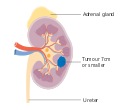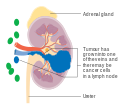Kidney cancer: Difference between revisions
mNo edit summary |
CSV import |
||
| (2 intermediate revisions by the same user not shown) | |||
| Line 1: | Line 1: | ||
= Kidney Cancer = | {{Infobox medical condition | ||
| name = Kidney Cancer | |||
| image = | |||
| caption = | |||
| field = Oncology | |||
| symptoms = Blood in urine, back pain, weight loss | |||
| complications = Metastasis | |||
| onset = | |||
| duration = | |||
| types = Renal cell carcinoma, transitional cell carcinoma | |||
| causes = Genetic mutations, smoking, obesity | |||
| risks = Family history, hypertension | |||
| diagnosis = Imaging, biopsy | |||
| treatment = Surgery, targeted therapy, immunotherapy | |||
| prognosis = Variable | |||
| frequency = | |||
}} | |||
'''Kidney cancer''' | '''Kidney cancer''' is a type of [[cancer]] that starts in the [[kidney]]s. The most common type of kidney cancer in adults is [[renal cell carcinoma]]. Other less common types include [[transitional cell carcinoma]] and [[Wilms' tumor]], which is more common in children. | ||
== Signs and Symptoms == | |||
The signs and symptoms of kidney cancer may include: | |||
* [[Hematuria]] (blood in the urine) | |||
* Persistent [[back pain]] | |||
* Unexplained [[weight loss]] | |||
* [[Fatigue]] | |||
* [[Fever]] | |||
== | == Causes == | ||
The exact cause of kidney cancer is not known, but several risk factors have been identified. These include: | |||
* [[Smoking]] | |||
* | * [[Obesity]] | ||
* [[Hypertension]] (high blood pressure) | |||
[[ | |||
* Obesity | |||
* | |||
* Family history of kidney cancer | * Family history of kidney cancer | ||
* Certain genetic conditions, such as von Hippel-Lindau disease | * Certain genetic conditions, such as [[von Hippel-Lindau disease]] | ||
== Diagnosis == | == Diagnosis == | ||
Diagnosis of kidney cancer typically involves | Diagnosis of kidney cancer typically involves: | ||
* [[Imaging]] tests such as [[CT scan]] or [[MRI]] | |||
* [[Biopsy]] to confirm the presence of cancer cells | |||
== Treatment | == Treatment == | ||
Treatment for kidney cancer | Treatment options for kidney cancer depend on the stage and type of cancer and may include: | ||
* Surgery to remove | * [[Surgery]] to remove the tumor or the entire kidney (nephrectomy) | ||
* Targeted therapy | * [[Targeted therapy]] | ||
* Immunotherapy | * [[Immunotherapy]] | ||
* Radiation therapy | * [[Radiation therapy]] | ||
== Prognosis | == Prognosis == | ||
The | The prognosis for kidney cancer varies depending on the stage at diagnosis and the overall health of the patient. Early detection and treatment improve the chances of a favorable outcome. | ||
== Prevention == | == Prevention == | ||
While there is no | While there is no sure way to prevent kidney cancer, reducing risk factors such as quitting smoking, maintaining a healthy weight, and controlling blood pressure may help lower the risk. | ||
== | == See Also == | ||
* [ | * [[Renal cell carcinoma]] | ||
* [ | * [[Transitional cell carcinoma]] | ||
* [[Wilms' tumor]] | |||
== References == | == References == | ||
{{Reflist}} | |||
* | |||
* | == External Links == | ||
* [https://www.cancer.org/cancer/kidney-cancer.html American Cancer Society: Kidney Cancer] | |||
* [https://www.cancer.gov/types/kidney National Cancer Institute: Kidney Cancer] | |||
[[Category:Kidney cancer]] | |||
[[Category:Kidney | |||
[[Category:Oncology]] | [[Category:Oncology]] | ||
[[Category:Urology]] | |||
<gallery> | |||
File:Clear cell renal cell carcinoma high mag cropped.jpg|Clear cell renal cell carcinoma | |||
File:Papillary transitional cell carcinoma, renal pelvis, urinary obstruction,.jpg|Papillary transitional cell carcinoma | |||
File:Chromophobe renal cell carcinoma, eosinophilic variant - high mag.jpg|Chromophobe renal cell carcinoma | |||
File:Papillary renal cell carcinoma very high mag.jpg|Papillary renal cell carcinoma | |||
File:Diagram showing stage 1 kidney cancer CRUK 192.svg|Stage 1 kidney cancer | |||
File:Diagram showing stage 2 kidney cancer CRUK 209.svg|Stage 2 kidney cancer | |||
File:Diagram showing stage 3 kidney cancer CRUK 222.svg|Stage 3 kidney cancer | |||
File:Diagram showing stage 4 kidney cancer CRUK 231.svg|Stage 4 kidney cancer | |||
</gallery> | |||
Latest revision as of 00:56, 20 February 2025
| Kidney Cancer | |
|---|---|
| Synonyms | N/A |
| Pronounce | N/A |
| Specialty | N/A |
| Symptoms | Blood in urine, back pain, weight loss |
| Complications | Metastasis |
| Onset | |
| Duration | |
| Types | Renal cell carcinoma, transitional cell carcinoma |
| Causes | Genetic mutations, smoking, obesity |
| Risks | Family history, hypertension |
| Diagnosis | Imaging, biopsy |
| Differential diagnosis | N/A |
| Prevention | N/A |
| Treatment | Surgery, targeted therapy, immunotherapy |
| Medication | N/A |
| Prognosis | Variable |
| Frequency | |
| Deaths | N/A |
Kidney cancer is a type of cancer that starts in the kidneys. The most common type of kidney cancer in adults is renal cell carcinoma. Other less common types include transitional cell carcinoma and Wilms' tumor, which is more common in children.
Signs and Symptoms[edit]
The signs and symptoms of kidney cancer may include:
- Hematuria (blood in the urine)
- Persistent back pain
- Unexplained weight loss
- Fatigue
- Fever
Causes[edit]
The exact cause of kidney cancer is not known, but several risk factors have been identified. These include:
- Smoking
- Obesity
- Hypertension (high blood pressure)
- Family history of kidney cancer
- Certain genetic conditions, such as von Hippel-Lindau disease
Diagnosis[edit]
Diagnosis of kidney cancer typically involves:
Treatment[edit]
Treatment options for kidney cancer depend on the stage and type of cancer and may include:
- Surgery to remove the tumor or the entire kidney (nephrectomy)
- Targeted therapy
- Immunotherapy
- Radiation therapy
Prognosis[edit]
The prognosis for kidney cancer varies depending on the stage at diagnosis and the overall health of the patient. Early detection and treatment improve the chances of a favorable outcome.
Prevention[edit]
While there is no sure way to prevent kidney cancer, reducing risk factors such as quitting smoking, maintaining a healthy weight, and controlling blood pressure may help lower the risk.
See Also[edit]
References[edit]
<references group="" responsive="1"></references>
External Links[edit]
-
Clear cell renal cell carcinoma
-
Papillary transitional cell carcinoma
-
Chromophobe renal cell carcinoma
-
Papillary renal cell carcinoma
-
Stage 1 kidney cancer
-
Stage 2 kidney cancer
-
Stage 3 kidney cancer
-
Stage 4 kidney cancer







